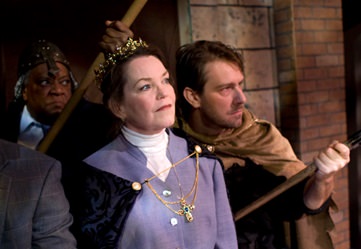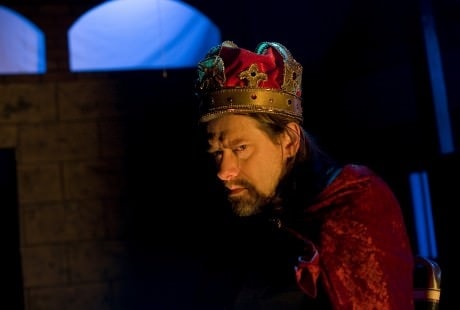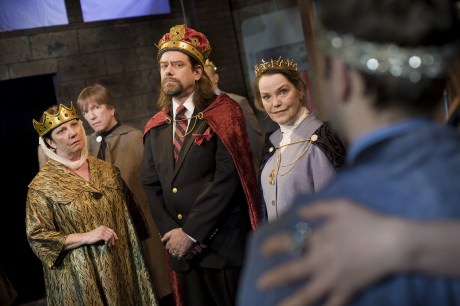King John: Love and Fear in a Fallout Shelter
King John is famously known as one of Shakespeare’s least-performed plays, but there are many reasons to see it. It is a credit to WSC Avant Bard and its Artistic Director, W. Thompson Prewitt, that they are offering us a richly imaginative, amusing, and ultimately moving interpretation. As A.D. Nuttall has said, and Harold Bloom quotes in his book Shakespeare: The Invention of the Human Shakespeare “allow[s] us to see much in human character that was doubtless there already but which we never would have seen had we not read Shakespeare, and seen him well performed.” This is a sparkling, original, must-see production.
Power politics and the dichotomy between compassion and self-interest are certainly relevant themes for today. John as written is manipulative and sly, and he collapses in the course of the action, but his doomed, hysterical character is offset by the bluff, amusing, and ultimately admirable Bastard, natural son of Richard the Lion Heart, whose ghost hovers over the play. The plot encompasses struggles for succession, war, ecclesiastical maneuvering, and two beautifully portrayed, forceful women fighting for their sons. John’s major historical significance is sometimes deemed limited to the signing of the Magna Carta, but as a study of an intelligent, ruthless, and in the end, cowardly king, his character fascinates.

Director Tom Prewitt, also the Artistic Director, has conceived the play as seen through the eyes of a very young child, in the early 1960s, constructing his own imaginary world in a fallout shelter. The fears of the Cold War provide a striking analogy to the fears of Arthur and Henry, the two youngest characters. Prewitt also pays special attention to the dynamics between parents and children which permeate the play, and, as he notes “how such relationships work, and in many cases, don’t.”
King John was written sometime between 1587 and 1598, according to the Cambridge Shakespeare (Edited by L.A. Beaurline). It was first printed in the 1623 Folio. There have been several notable productions, from the 18th century to the present.
Prewitt employs a group of exceptional actors featuring women successfully in male parts. Queen Felipe of France is played with great insight and discipline by Charlotte Akin, Cam Magee doubles very convincingly as Queen Elinor and Pembroke, and Rebecca Swislow shows considerable acting range and talent as Blanche and Salisbury. Anne Nottage, who shines as the desperate mother Constance, performs Bigot, one of the English lords, with style and intensity.
In his book The Meaning of Shakespeare, Harold Goddard refers to John as “like a bewildered child in the night”. Harold Bloom has referred to him as “mostly a dour puzzle and an unhappy surprise.” But as other critics have noted, he is also a brilliant politician who is dogged by ill luck and his own moral failings. John’s anger over the death warrant for Arthur, his older brother Geoffrey’s son and his political rival, would likely be compared by an Elizabethan audience to Elizabeth’s anger over the execution of Mary Queen of Scots, which she is said to have blamed largely on her secretary, William Davison. Ian Armstrong plays him as a smug narcissist who has no empathy for Arthur but falls apart completely when his mother dies. It is a compelling and witty performance.
The Bastard has been compared to John Bull, the spirit of England, and has been referred to by Harold Bloom as “the first character in Shakespeare who fully can charm and arouse us.” During the play he progresses from a voluble, perceptive soldier to a capable and inventive leader. Bruce Alan Rauscher deftly shades the many sides of his complex character, and his loyalty to the utterly undeserving John is touching and rings true to human experience. The admiration of a child for a narcissistic parent, or father figure, is a timeless theme.
William Hazlitt has said, “The excess of maternal tenderness, rendered desperate by the fickleness of friends and the injustice of fortune, and made stronger in will, in proportion to the want of all other power, was never more finely expressed than in Constance.” Anne Nottage finds the comic elements in Constance’s rage, while easily mastering the more poignant scenes of loss and remembrance.
Elinor, whose intellectual duel with Constance forms one of the more interesting dynamics, concentrates on advancing her son’s fortunes. She displays a realistic, sometimes cynical attitude, and she has a delightfully conspiratorial air as she advises and manipulates him. Cam Magee finds the humor, power, and sheer energy of Elinor, in a fitting tribute to this remarkable queen.
In the Cambridge Shakespeare, the Introduction pairs three power players; Elinor, the Citizen, and Pandulph; and three innocents; Arthur, Lewis, and the Bastard. But in there are also such characters as Hubert, who develops compassion during the play, and Constance, whose traumatic loss ultimately leads to madness. These characters, along with Melun, who warns the British lords of treachery, provide a moral contrast to John’s self-interest.
Hubert as played by Slice Hicks (who also performs memorably as the Citizen) is a loyal retainer who is ultimately undone by his own compassion. Connor J. Hogan (Arthur) turns in an equally impressive performance, evolving from immature adolescent to thoughtful young man to mature adult as his fate becomes clear. The scene between Hubert and Arthur is stunning, and one of Shakespeare’s best. Rebecca Swislow is to be congratulated for finding some amusing nuances and heartfelt moments in the role of Blanche, who is often overshadowed by the commanding presences of Constance and Elinor.

William Hayes is delightfully nerdy as Robert Falconbridge, and the picture of manly valor as the hot-tempered Dauphin. Sun King Davis is a roaring Neanderthal as Austria, focused and wary as the Executioner, and frighteningly convincing as the dying Melun, whose conscience provides another ethical touchstone for the play.
Christopher Henley achieves something remarkable with Pandulph; not only does he convey the Machiavellian brilliance of the man, but he even displays some sympathy for Constance, which makes his character much more believable. Kim Curtis as Essex, with some ingenuity, finds a unique aspect of his character for every scene, and Chuck Young as Chatillion and the Executioner is always strong, truthful and interesting to watch.
Ethan Ocasio (the Child) is strikingly natural in every scene. He is able to change from a lonely boy in the early 60s to Peter of Pomfret to Arthur himself, in an especially touching moment, without ever seeming false or coy.
There are many inspired directorial touches here, such as wedding pictures taken after the engagement of Blanche and the Dauphin; an onstage castle which the Child plays with; and extremely well-staged and provocative battle scenes. The costumes and props fit in beautifully with the overall concept of the production.
The production’s Sound Design (Bradley C. Porter), Scenic Design (Joseph Musumeci), Production Design (Chelsea Mayo) and Lighting Design by Joseph R. Walls are inventive, effective, and always appropriate to the play. Musumeci sets the play in a fallout shelter eerily reminiscent of the paranoia of the 1960s, but also adaptable enough to represent the early 13th Century scenes. Walls’ lighting effectively communicates the sombreness of war while at the same time conveying the majesty of King John’s palace. Porter’s powerful sound designs varies from terrifying machine gun fire in the war scenes to hauntingly soothing choral music. Elizabeth Ennis’ costume design is extremely imaginative and diverse from fatigues for the English Lords to the jeweled dresses for Lady Blanche.

Special mention to Fight Directors Robb Hunter and Craig Lawrence for their innovative staging. Every actor gives his all for the production, and because the style is not realistic, the imagination of the director, and the audience, can hold sway.
This is the way Shakespeare should be, and so often isn’t. What a delight to see it here, now, in its full glory.
Running Time: Approximately two and half hours, including one intermission.
King John plays through November 24, 2013 at WSC Avant Bard – at Theatre on the Run – 3700 South Four Mile Run Drive, in Arlington, VA. For tickets, call the box office 703-418-4808, or purchase them online.





